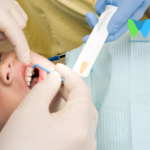Dental fluoride treatments are an essential part of maintaining oral health, providing a protective barrier against cavities and strengthening enamel. However, to maximize the benefits of these treatments, it is important to follow specific post-treatment guidelines, particularly regarding eating and drinking.
This blog will provide clear, straightforward advice on how long you should wait to eat after a fluoride treatment and what types of foods and beverages are most suitable afterward.
When Can I Eat After Dental Fluoride Treatment | Why Waiting Is Important
After a dental fluoride treatment, the fluoride varnish or gel needs time to fully adhere to and set on your teeth. Eating or drinking too soon can interfere with this process, reducing the effectiveness of the treatment. By following the recommended waiting period, you ensure that the fluoride can provide its maximum protective benefits.
After receiving a fluoride treatment, adhering to recommended waiting periods before eating or drinking is crucial for several reasons:
Maximizing Fluoride Absorption
Ensuring Effectiveness:
The fluoride applied to your teeth needs time to fully integrate with your enamel. By waiting the recommended 30 minutes, you allow the fluoride to:
- Absorb more effectively into the enamel
- Provide maximum protection against cavities
- Strengthen the tooth structure
Preventing Interference
Maintaining Treatment Integrity:
Consuming food or drinks too soon after treatment can interfere with the adherence of fluoride to your teeth. Early ingestion can:
- Wash away or dilute the fluoride
- Reduce the overall effectiveness of the treatment
Enhanced Dental Health Benefits
Long-Term Protection:
By giving fluoride adequate time to set, you enhance its ability to:
- Remineralize weakened enamel
- Protect against acid attacks from bacteria in your mouth
- Contribute to overall oral health
Guidelines for Post-Treatment
Soft Foods and Water:
After the initial waiting period, it is best to consume soft foods and water, avoiding hard, sticky, or acidic foods and beverages which can:
- Disrupt the fluoride application
- Cause premature removal of the treatment
When Can I Eat After Dental Fluoride Treatment
How Long Should You Wait After Dental Fluoride Treatment ?
General Recommendation:
It is generally advised to wait at least 30 minutes after a fluoride treatment before eating or drinking; and to refrain from eating hard foods, brushing, and flossing for 4-6 hours. This waiting period allows the fluoride to fully absorb into the enamel and start its protective work.
Specific Instructions:
Your dentist may provide specific guidelines based on the type of fluoride treatment used and your individual dental needs. Always follow your dental professional’s advice.
Types of Food and Drink Post-Treatment
Once the recommended waiting period has passed, it is still crucial to choose appropriate foods and beverages to further enhance the treatment’s effectiveness.
- Soft Foods: After the waiting period, opt for soft foods that are less likely to remove the fluoride from your teeth. Good choices include:
- Yogurt
- Soft cheeses
- Mashed potatoes
- Soup (not too hot)
- Pasta
- Avoid Sticky or Hard Foods: Foods that are sticky or hard can dislodge the fluoride coating. Examples to avoid include:
- Hard candies
- Chewy or sticky candy
- Nuts
- Raw vegetables like carrots and celery
- Temperature Considerations: Avoid consuming very hot or very cold foods and beverages immediately after the treatment. Extreme temperatures can affect the fluoride’s adherence to your teeth.
When Can I Eat After Dental Fluoride Treatment
Drinking Guidelines
- Water: It is advisable to drink only water in the first 30 minutes post-treatment. Water helps to prevent dehydration and does not interfere with the fluoride setting process.
- Avoid Acidic Beverages: Steer clear of acidic drinks such as fruit juices, sodas, and coffee right after the treatment. These beverages can erode enamel and counteract the benefits of fluoride.
Oral Hygiene Post-Treatment
In addition to eating and drinking guidelines, consider the following oral hygiene tips:
- Brushing and Flossing: Delay brushing and flossing your teeth for at least 4-6 hours after the fluoride treatment. This allows the fluoride to remain on your teeth for the maximum amount of time, enhancing its effectiveness.
- Night-Time Considerations: If your treatment was performed late in the day, your dentist might recommend waiting until the following morning to resume brushing and flossing.
To maximize the benefits of your dental fluoride treatment, adhere to the recommended waiting period before eating or drinking. Typically, waiting at least 30 minutes is sufficient. Afterward, choose soft, non-sticky foods and avoid extreme temperatures and acidic beverages for 4-6 hours. Additionally, delay brushing and flossing for several hours to allow the fluoride to thoroughly integrate with your enamel.
By following these guidelines, you can ensure that your fluoride treatment provides optimal protection for your teeth, contributing to long-term oral health. For personalized advice, always consult with your dental professional.



